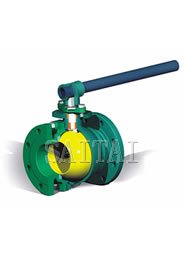Summary

A ball valve (like the butterfly valve and plug valve are one of the
family of valves called quarter turn valves) is a valve that opens by turning a handle attached to a ball inside
the valve. The ball has a hole, or port, through the middle so that when the port is in line with both ends of
the valve, flow will occur. When the valve is closed, the hole is perpendicular to the ends of the valve, and
flow is blocked. The handle or lever will be inline with the port position letting you "see"the
valve's position.
Remy Ball valves are durable and usually work to achieve perfect shutoff even after years of disuse. They are
therefore an excellent choice for shutoff applications (and are often preferred to globe valves and gate valves
for this purpose). They do not offer the fine control that may be necessary in throttling applications but are
sometimes used for this purpose.
Remy Ball valves are used extensively in industry because they are very versatile, pressures up to 10,000 psi,
temperatures up to 200 Deg C. Sizes from 1/4" to 12" are readily available They are easy to repair,
operate manually or by actuators.
Floating or Trunnion Mounted Ball
Parameters
ASME Pressure Classes: 150, 300, 600, 800, 900, 1500, 2500 Lb
Sizes: 1/2, 3/4, 1-1/4, 1-1/2, 2, 2-1/2, 3, 3-1/2, 4, 5, 6, 8, 10, 12, 14, 16, 18, 20 in ( DN 25 ~ 500 mm )
Ends: Welded, threaded and flanged.
ball: Floating, Trunnion Mounted; Side entry, top entry;
seal: Metal to Metal (Metal Seated); Rubber Seated (Soft Seated); PTFE Seated
Materials: Carbon steel, stainless steel, alloy steel.
鏈珯鏇存柊浜庡綋鍓嶆椂闂?024-11-23 4:01:33